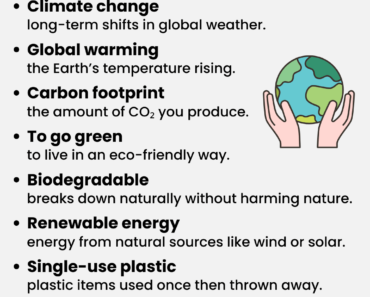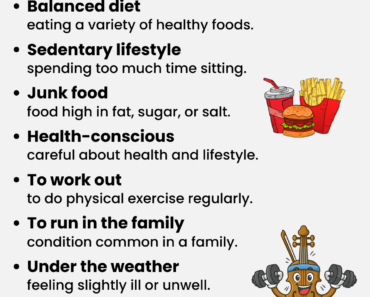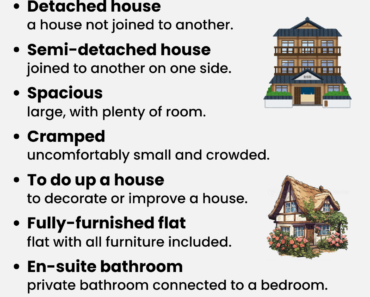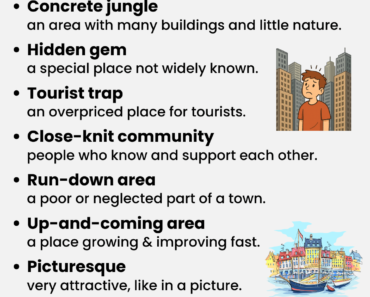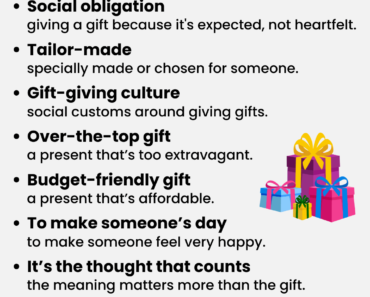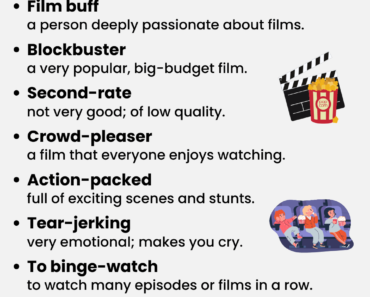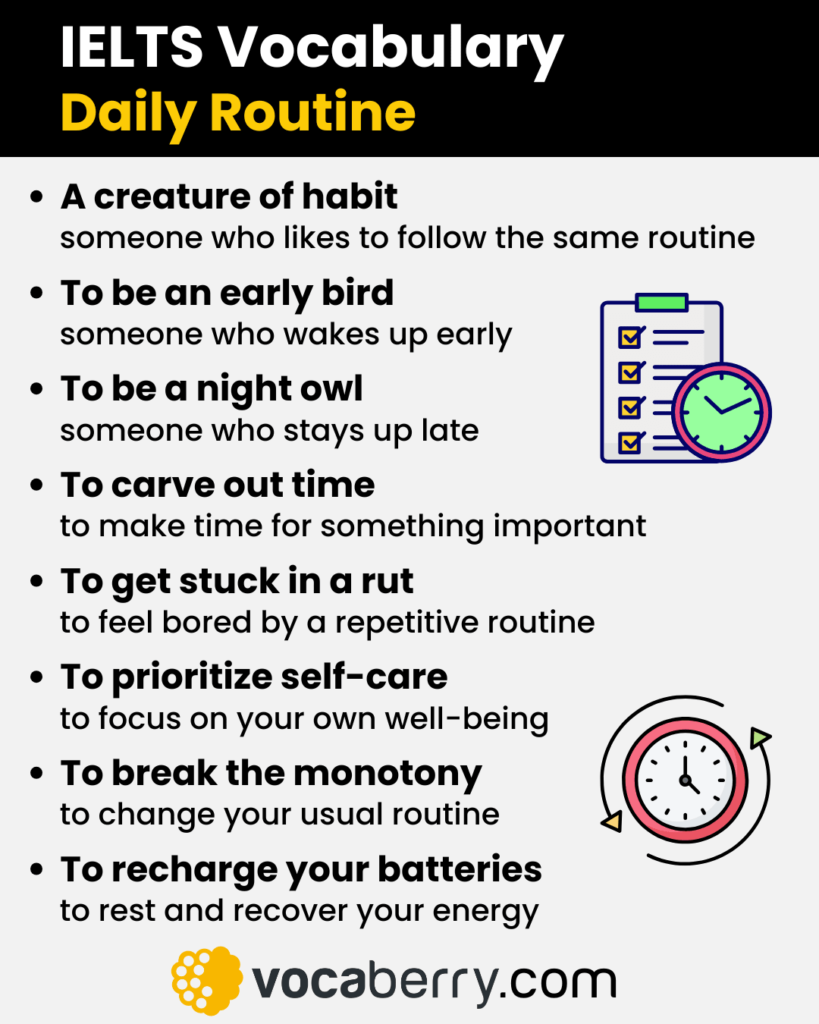
Daily routine is a common topic in the IELTS Speaking test. Examiners may ask you about your typical day, morning or evening habits, or how your routine has changed over time. In this guide, you’ll learn useful IELTS vocabulary for daily routine with clear definitions, followed by IELTS Speaking Part 1, Part 2, and Part 3 questions with sample answers.
IELTS Vocabulary for Daily Routine
Here is some useful IELTS vocabulary for talking about daily routines with clear definitions. These words and phrases will help you give better answers in the IELTS Speaking test.
- Early bird – someone who wakes up early
- Night owl – someone who stays up late
- Nine-to-five job – a typical full-time work schedule.
- Time-poor – not having enough free time due to being busy.
- Productive – doing a lot or achieving good results
- Counterproductive – doing something that has the opposite effect
- On an ad hoc basis – done only when necessary or without a fixed plan
- As regular as clockwork – happening at the same time every day
- Task prioritisation – deciding which tasks are most important
- Time blocking – planning tasks in specific time slots
- Binge-watch – to watch many episodes in one sitting
- Co-working – working with others in a shared space
- A creature of habit – someone who likes to follow the same routine
- Energy management – using energy wisely throughout the day
- Work-life balance – balance between job and personal life
- Rise and shine – wake up and start the day cheerfully
- Under the weather – feeling slightly ill or unwell
- Over and over again – repeatedly, many times
- Structured routine – a well-organized daily schedule
- Spontaneity – doing things without planning ahead
- A nighttime ritual – a regular habit done before bed
- Time-consuming task – something that takes a lot of time to do
- Household chores – regular cleaning or housework tasks
- Rush hour – the busiest time of day when people travel to or from work.
- Daily grind – one’s usual, often tiring or boring, daily routine
- To procrastinate – to delay doing something important
- To get my mind ready for the day – to mentally prepare in the morning
- To crawl out of bed – to get up slowly and unwillingly
- To stumble out of bed – to get up clumsily or half-asleep
- To put on a good playlist – to play music that sets a good mood
- To take periodic pauses – to stop briefly during the day for rest
- To commute – to travel between home and work or school.
- To start the day off – to begin the day by doing something.
- To run errands – to do small jobs outside, like shopping or going to the bank.
- To get off work – to finish work for the day.
- To do chores – to do household tasks like cleaning or washing dishes.
- To do the laundry – to wash and dry clothes.
- To tidy up – to clean or organize things.
- To de-stress – to relax and reduce stress
- To unwind – to rest and stop being stressed
- To scroll through social media – to look at posts or videos online.
- To catch up on sleep – to rest more to make up for lost sleep.
- To have some me-time – to spend time alone doing what you enjoy.
- To hit the books – to start studying seriously
- To hit the gym – to go to the gym to exercise.
- To work out – to exercise regularly to stay fit.
- To take a nap – to sleep for a short time during the day.
- To call it a day – to stop working or studying for the day.
- To feel a sense of productivity – to feel you’ve achieved something useful
- To be on a tight schedule – to have very little flexibility in your day
- To have a packed schedule – to have many things planned in your day.
- To manage your time well – to use your time effectively.
- To stick to a routine – to follow the same schedule regularly.
- To break the routine – to do something different from usual.
- To plan ahead – to organize things in advance.
- To take it easy – to relax and not do much.
- To stay up late – to go to bed later than usual.
- To get stuck in traffic – to be delayed while driving because of too many cars.
- To have breakfast on the go – to eat breakfast quickly while traveling.
- To go through my emails – to read and reply to email messages.
- To catch up on work / study – to finish something you didn’t have time for earlier.
- To spend quality time – to enjoy meaningful moments with loved ones.
- To burn the candle at both ends – to do too many things, leading to exhaustion.
- To pencil something in – to arrange a plan that might change later.
- To juggle responsibilities – to manage many tasks at the same time.
- To hit the ground running – to start a task or day energetically and effectively.
- To be pressed for time – to have very little time available.
- To get into a rhythm – to establish a steady routine
- To break the monotony – to do something different from the usual routine
- To go through the motions – to do something routinely without enthusiasm
- To stick to a schedule – to follow a planned timetable strictly
- To work around the clock – to work all day and night
- To take time out – to pause your day for rest or reflection
- To be on autopilot – to do things automatically without thinking, due to habit
- To lose track of time – to be unaware of how much time has passed
- To build healthy habits – to develop good and consistent practices
- To have a packed schedule – to have a lot of activities planned in a day
- To unwind after a long day – to relax after work or study
- To carve out time – to intentionally make time for something important
- To be stuck in a rut – to feel bored by a repetitive routine
- To lead a hectic lifestyle – to have a very busy and fast-paced daily life
- To burn the candle at both ends – to be busy from morning to night
- To clock in and out – to officially record the start and end of your workday
- To have a morning ritual – a personal, repeated habit done every morning
- To live a fast-paced life – to have a busy and rushed daily routine
- To maintain consistency – to follow your routine steadily without changes
- To push through fatigue – to keep going despite feeling tired
- To prioritize self-care – to make time for your own well-being
- To recharge your batteries – to take time to rest and recover energy
- To squeeze something into your day – to fit a task into a busy schedule
- To establish boundaries – to separate work and personal life in your routine
- To go off track – to fall out of your regular routine
IELTS Speaking: Daily Routine Questions & Answers
In this section, you’ll find IELTS Speaking Part 1, Part 2, and Part 3 questions on daily routine with sample answers. These examples show how the daily routine vocabulary can be used in your responses during the test.
IELTS Speaking Part 1 – Daily Routine
What’s your daily routine like?
My routine is quite structured. I usually wake up early, have coffee, and take a few minutes to get my mind ready for the day. Then I head to work and try to stay productive using time blocking. In the evening, I like to unwind after a long day by watching a show or spending quality time with my family.
Do you prefer mornings or evenings?
I’ve always been an early bird. I feel more focused in the morning when it’s quiet and calm. Starting my day early helps me stick to a routine and complete important tasks before distractions appear. By evening, I’m usually ready to wind down and relax after being active all day.
How do you usually start your day?
I normally crawl out of bed around six, make a cup of coffee, and put on a good playlist to boost my mood. After that, I check my planner and organize my tasks. This little morning ritual helps me feel motivated and keeps my mind clear before the workday begins.
What do you do after work?
After finishing work, I try to unwind after a long day by going for a walk or reading. Sometimes I just binge-watch a show to relax. I also like to carve out time for family, which helps me maintain a healthy work-life balance and not feel time-poor during the week.
How do you stay focused during the day?
I try to take short breaks to recharge my batteries and keep my energy levels up. I also prioritize self-care by staying hydrated and listening to music when I feel tired. Avoiding distractions and using time management techniques really helps me stay focused all day long.
IELTS Speaking Part 2 – Daily Routine Cue Card
Describe your daily routine.
You should say:
- what your daily routine is like
- what part of the day you enjoy most
- whether your routine has changed recently
- and explain how you feel about your daily routine
Sample Answer:
My daily routine is quite structured and helps me stay productive and maintain a good work-life balance. I usually wake up around six in the morning since I’m naturally an early bird, ready to rise and shine for the day ahead. The first thing I do is make a cup of coffee, open the window for some fresh air, and get my mind ready for the day. Then I take a quick shower, have breakfast, and check my planner to pencil in my top priorities using time blocking. This really helps me manage my time efficiently and avoid feeling time-poor when things get busy.
Once I’m ready, I head to work, which is a typical nine-to-five job. I usually hit the ground running, focusing on my most demanding tasks in the morning when my energy is highest. Throughout the day, I try to take periodic pauses to stretch or grab a coffee, just to recharge my batteries. I also make an effort to avoid counterproductive habits like scrolling through social media. Since I work in a co-working space, I get to interact with people from different backgrounds, which keeps the day from becoming a daily grind.
After work, I like to unwind after a long day by going for a walk or spending quality time with my family. Sometimes, I binge-watch a series or read a self-help book to stay motivated. Before bed, I follow a simple nighttime ritual where I reflect on the day and plan ahead for tomorrow.
Overall, my routine runs as regular as clockwork, but I still try to add a touch of spontaneity on weekends. I find that keeping a structured routine yet staying flexible helps me feel grounded, motivated, and ready to take on each new day.
IELTS Speaking Part 3 – Daily Routine Discussion
IELTS Speaking Part 3 questions about daily routine often ask you to compare routines across age groups, discuss the impact of routines on productivity and well-being, and give opinions on how modern life has changed people’s daily habits.
Do you think having a routine is important?
Yes, I think having a routine is absolutely essential because it brings a sense of structure and order to daily life. When people stick to a routine, they tend to be more productive, focused, and less stressed since they know exactly what to expect. A consistent schedule also helps with time management and prevents people from feeling time-poor or overwhelmed. Personally, I find that following a structured routine helps me stay grounded and motivated, especially during busy weeks. However, I believe a little spontaneity is also necessary to keep life interesting and enjoyable.
How have people’s routines changed in modern times?
Routines have changed dramatically in recent years due to technology and flexible work arrangements. Many people now work around the clock, checking emails even after hours or attending online meetings from home. While this gives more flexibility, it also makes it harder to set boundaries between work and personal life. Nowadays, people rely heavily on time blocking and task prioritisation just to stay organized. However, being constantly connected can be exhausting, so learning to recharge your batteries and protect your personal time is more important than ever.
How can people make their daily routines more enjoyable?
The best way to make a routine enjoyable is to add small activities that make you feel happy or relaxed. For example, you can put on a good playlist, take short breaks to de-stress, or carve out time for things you genuinely love, such as reading or spending time with family. When you include moments of joy and rest, your schedule feels less like a daily grind and more like a balanced lifestyle. I also think celebrating small achievements throughout the day helps you feel a sense of productivity and motivation to keep going. Routines should energize you, not drain you, so pleasure and purpose should always go hand in hand.
Should people change their routine from time to time?
Yes, I think it’s very healthy to change your routine every once in a while. Doing the same things over and over again can feel repetitive and eventually become counterproductive. Making small changes, like adjusting your morning ritual, trying a new hobby, or shifting your schedule slightly, can really help you break the monotony. Personally, I like to review my daily habits every few months to see what’s working and what needs to change. Refreshing your routine keeps life exciting, prevents burnout, and helps you avoid feeling stuck in a rut.
More IELTS Vocabulary Topics
If you found this lesson useful, explore other IELTS Speaking topics to expand your vocabulary and practice with sample answers:
- IELTS Vocabulary: Accommodation
- IELTS Vocabulary: Advertisement
- IELTS Vocabulary: Animals
- IELTS Vocabulary: Art
- IELTS Vocabulary: Artificial Intelligence
- IELTS Vocabulary: Books
- IELTS Vocabulary: Childhood
- IELTS Vocabulary: Crime and Punishment
- IELTS Vocabulary: Culture and Traditions
- IELTS Vocabulary: Education
- IELTS Vocabulary: Environment
- IELTS Vocabulary: Family
- IELTS Vocabulary: Fashion and Clothes
- IELTS Vocabulary: Films
- IELTS Vocabulary: Food & Diet
- IELTS Vocabulary: Friends
- IELTS Vocabulary: Gifts
- IELTS Vocabulary: Health
- IELTS Vocabulary: Hobbies
- IELTS Vocabulary: Hometown
- IELTS Vocabulary: Money
- IELTS Vocabulary: Museums
- IELTS Vocabulary: Music
- IELTS Vocabulary: Plants
- IELTS Vocabulary: Shopping
- IELTS Vocabulary: Social Media
- IELTS Vocabulary: Sports
- IELTS Vocabulary: Technology
- IELTS Vocabulary: Transport
- IELTS Vocabulary: Travel
- IELTS Vocabulary: Weather
- IELTS Vocabulary: Work & Jobs

